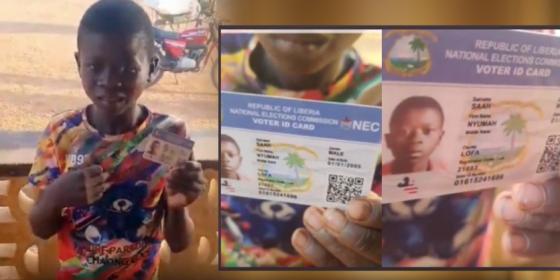Liberia: NEC ‘Investigating’ Voter Registration Malpractices

Picture shows underage children holding voter ID cards .
... The Commission has uncovered the cases during the stage of its deduplication and adjudication of voters’ information collected from 2,080 voter registration centers across the country.
The National Elections Commission says it has begun investigating several issues of underaged voter registration and duplicates, which violate the country’s electoral law.
The Commission has uncovered the cases during the stage of its deduplication and adjudication of voters’ information collected from 2,080 voter registration centers across the country.
While the NEC has not disclosed the number and magnitude of cases of voter registration malpractices discovered so far, the alleged culprits, according to the electoral body, have been deactivated while the investigation is ongoing and those who are found guilty will have the voters' registration removed and a complaint filed to the Ministry of Justice for prosecution.
“Several duplicates and underaged registrations are being detected, and their voter information deactivated until further investigation,” the Commission said in a release yesterday. “All ineligible registrants will be removed and, in cases where is/are alleged criminal motives, referred to the Ministry of Justice for immediate action.”
The Commission’s revelation comes after phase two of its voters' registration, which ran from April 21 to May 11, was marred by complaints of underage registration and other technical issues.
“[This comes as] the National Elections commission says it has commenced the final process of deduplication and adjudication of voters information collected from the 2,080 voter registration centers across Liberia, following the completion of the data synchronization from the phase two counties.”
The biometric voter registration exercise, split into two phases, was marred by technical glitches, including shortages of biometric cards that prevented some Liberians from registering.
But the electoral body claimed that the overall impact of the technical glitches on the turnout was minimal, something electoral experts disagree on.
The Commission has moved to use biometric equipment for its voter registration process to streamline the electoral process and reduce the potential for double registration and other forms of voter fraud after coming under pressure to ditch its optical manual registration (OMR) system.
The OMR system, for many, does not improve the accountability and transparency of electoral processes and is usually tainted by controversy and mistrust.
The biometric VR system, which is also not a silver bullet, according to many experts, is seen as a safe route to produce a credible voter roll void of double registration.
Phase one, according to the Commission’s preliminary data, produced a register of a little over 1.4 million people. Of this number, 711,410 are females, while 723,799 are males.
But the figures are subject to change depending on the outcome of the deduplication and adjudication processes, the electoral body noted. Data about phase two is yet to be discovered as the electoral body is still tabulating the results collected.
Phase one covered Bomi, Margibi, Grand Bassa, Grand Cape Mount, Gbarpolu, and Montserrado. While the phase two targets Bong, Grand Kru, Grand Gedeh, Lofa, Nimba, Sinoe, Maryland, River Cess, and River Gee counties.
Meanwhile, the Commission has announced that the exhibition of the provisional registration roll will commence on June 12 -17 across the country. According to the Commission, it is vital that the general public bring forward all concerns during the exhibition exercise, saying the roll is being made available for verification, inclusion, and objection.
